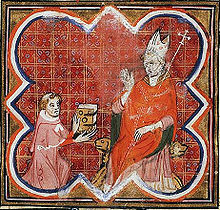William of Blois

Wilhelm von Blois , called Wilhelm with the white hands ( Guillaume aux Blanches Mains , * 1135 ; † September 7, 1202 ), was Bishop of Chartres (1164–1176) Archbishop of Sens (1169–1176), Archbishop of Reims (1176– 1202) and cardinal . He was the first Archbishop of Reims who was peer of France and Duke of Reims.
Life
Born as the son of Count Theobald (Thibaut) IV of Blois and Mathilde of Carinthia, Wilhelm was appointed to church service at a very young age and raised by Bernhard von Clairvaux . He became a canon at Saint-Quiriace in Provins , then church governor of Soissons and Troyes . In 1164 he was elected Bishop of Chartres and, despite his young age and reluctance, Pope Alexander III. also confirmed. In 1169 the cathedral chapter of Sens elected him archbishop; he took up the new task, but did not give up the old one.
William of Blois confirmed the privileges of the recently founded city of Villeneuve-l'Archevêque and restored order in some monasteries where the monastic rules had been relaxed. 1175, after the death of Archbishop Heinrich , the cathedral chapter of Reims chose him as his successor. In connection with taking office, he gave up his previous dioceses this time. In the same year he anointed his nephew Philip II as King of France as a co-king of his father Louis VII.
However, this did not prevent him from joining the coalition as one of the brothers of the Queen Mother Adele of Champagne , which opposed the new king after the death of Louis VII in 1180 in the following year, since the family, the House of Blois , to their position of power as Feared rulers of the empire. When the English King Henry II , addressed by Philip II and Adele , who was at the same time the most powerful vassal of the Crown as Duke of Normandy and Guyenne , sided with Philip and also made it clear that he was his royal cousin would never abandon France and even protect him against major attacks by the counts, the coalition broke up. In 1182 Wilhelm submitted to his nephew.
In 1182 he accepted the Willelmine charter of the citizens of Reims, which was to remain in force for five centuries.
Web links
- Champagne, Guillaume de. In: Salvador Miranda : The Cardinals of the Holy Roman Church. ( Florida International University website), accessed December 17, 2016.
- Guillaume aux Blanches Mains à Sens ( Memento of April 16, 2007 in the Internet Archive ) (French)
- La charte willelmine (French)
| predecessor | Office | successor |
|---|---|---|
| Henri de France |
Archbishop of Reims 1175–1202 |
Guy Pare |
| Hugues de Toucy |
Archbishop of Sens 1169–1176 |
Guy de Noyers |
| Robert of Chartres |
Bishop of Chartres 1164–1176 |
John of Salisbury |
| personal data | |
|---|---|
| SURNAME | William of Blois |
| ALTERNATIVE NAMES | Wilhelm with the white hands |
| BRIEF DESCRIPTION | French Roman Catholic bishop and cardinal |
| DATE OF BIRTH | 1135 |
| DATE OF DEATH | September 7, 1202 |
